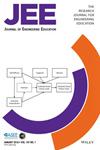Elements of disenchantment: Exploring the development of academic disenchantment among US engineering graduate students
Abstract
Background
Given high attrition rates and lack of interest in faculty careers, it is crucial to understand how doctoral engineering students conceptualize academia and academic careers.
Purpose/Hypothesis
This study aims to characterize the development of academic disenchantment among engineering students who have considered departure from their doctoral programs. Schema theory was used to explore how students develop and evolve in their conceptualizations of academia through their lived experiences.
Design/Method
Data were collected from 42 graduate students from research-intensive universities across the United States who participated in qualitative, semi-structured interviews investigating expectations for graduate school, experiences, attrition and persistence considerations, and career trajectories. The transcripts were thematically analyzed through open and axial coding to understand how students constructed their schemas of the academy.
Findings
Experiences and quotations of four participants are presented to describe the results of the transcripts. Participants' misaligned expectations of their graduate program's values and practices, coupled with a lack of agency and support, led them to see their graduate programs as antagonistic to their short- and long-term career success. Even for students who may likely persist through to PhD degree completion, the development of disenchantment dissuades students—even those who once desired a faculty career—from interest in the academy.
Conclusions
By understanding how disenchantment arose in our participants' experiences, we better understand how to equip students with resources that will help them navigate graduate programs. This research advances the literature by identifying underutilized opportunities to prepare students to cope with the challenges of engineering doctoral education.

 求助内容:
求助内容: 应助结果提醒方式:
应助结果提醒方式:


